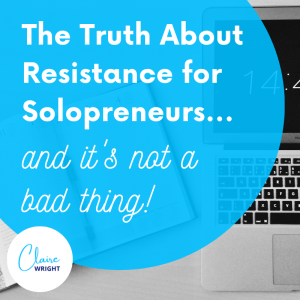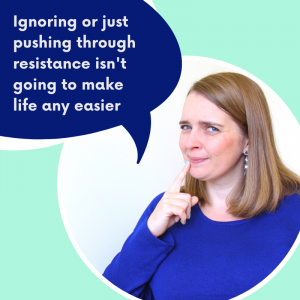There’s a common perception that resistance is a bad thing. Something to be avoided at all costs. The truth about resistance is that it’s an insight, a clue about what is going on below the logical thoughts.
Those feelings that you might categorise under resistance like doubts, overwhelm, second-guessing, procrastination and perfectionism are your subconscious trying to keep you safe from something.
The second truth is that ignoring those insights, just pushing through your resistance isn’t going to make life any easier. Because you aren’t learning the lessons your subconscious is trying to share. You aren’t addressing the fears, the hesitations, the beliefs that are driving your emotions and behaviours.
So let’s explore where resistances come from and how to address them.
Shoulds
In business, we are sold so many different ways of becoming successful and so many versions of what success should be. You need to be on Instagram Reels, you should be doing Facebook lives, if you aren’t targeting a six-figure business you are setting your goals too low.
We overlook the fact that these are other people’s things. They are things that have worked for other business owners or things business owners believe will work for them. They are other people’s dreams, other people’s motivations and though we can be inspired by them, we need to reflect that back through our lens.
One of the major lenses that we can review these ‘should’s through is the one of enjoyment. Making something, whether that’s a tactic, a goal or a strategy part of our business means we are going to need to learn about it and generally do it repeatedly. One Instagram Reel is unlikely to get you onto the rich list. So if you hate making Reels then it shouldn’t be part of your strategy and tactics. There are heaps of different ways to reach your audience. You need to find one that you enjoy so that you are happy to learn about doing it well and you enjoy the process of doing it so you can do it repeatedly.
Pre-Judgement
Another aspect that causes resistance is that we want to know something is going to work before we put our time and energy into it. We logically know we have limited time and energy (and money) so putting this into something with an unknown outcome seems illogical.
Then w hold ourselves back from creating that offer, or course, or choosing who we want to work with because it could be the ‘wrong’ decision. We could go down the ‘wrong’ path. But the only way to know if that was the ‘wrong’ path is to try.
We are always guessing, experimenting and trying things out. Especially as what worked once isn’t a guarantee that it will work again. Past performance is not a reliable indication of future performance. The disclaimer for every financial, investment and even business strategy advice.
It’s only by taking action that we figure out what works and what doesn’t work. I know seeing your business as one huge experiment doesn’t reassure your need to create stability and safety. But that approach allows us to release the need to see a direct cause and effect. Especially as one action rarely is the only input to create the one output.
Belief
The last thing I want to cover when we talk the truth about resistance is believing it’s actually possible. And this brings up heaps of thoughts about imposter, it can work for other people, but it won’t work for me, who am I to deserve this to be easy, etc.
What I find when I talk to people about actions they are resisting is that truly, deep down they don’t really believe that the action they are avoiding will generate the outcomes they desire. Like I don’t genuinely believe that posting consistently in Facebook groups is going to increase the number of clients I have. One of my personal favourites.
So it’s necessary to question if that’s a wise strategy for me to follow. If I don’t believe the outcome is possible from the inputs I’m less likely to acknowledge when it is working. I will overlook evidence that disproves my belief.
If you can suspend your need to trace cause and effect, long enough, leaning into the experimentation approach with curiosity can overcome some of these unhelpful beliefs. But you need to pair this with an objective review. One that takes into consideration more than a single cause and effect. For example, I haven’t sold a package directly from Facebook groups posts for a while. But the majority of my sign-ups to webinars, and therefore my email list, came from groups. In the long term could those people become clients, totally possible.
The Truth About Resistance
Resistance is a tool. You can choose to ignore it and probably keep coming up against the same resistances over and over. Continually setting your conscious and subconscious up in a battle, logic vs emotion, desires vs perceived safety. Or you can choose to use your resistances to create self-awareness, to improve your productivity and your business.
If you need my help in harnessing the insights of your resistances then reach out for a free discovery and unblocking session where we identify the reason for your resistance and make a plan for what you really need to do.
Watch the Video
Pin for Later


Subscribe

Pingback: Five Ways Imposter Impacts Your Business - Claire Wright